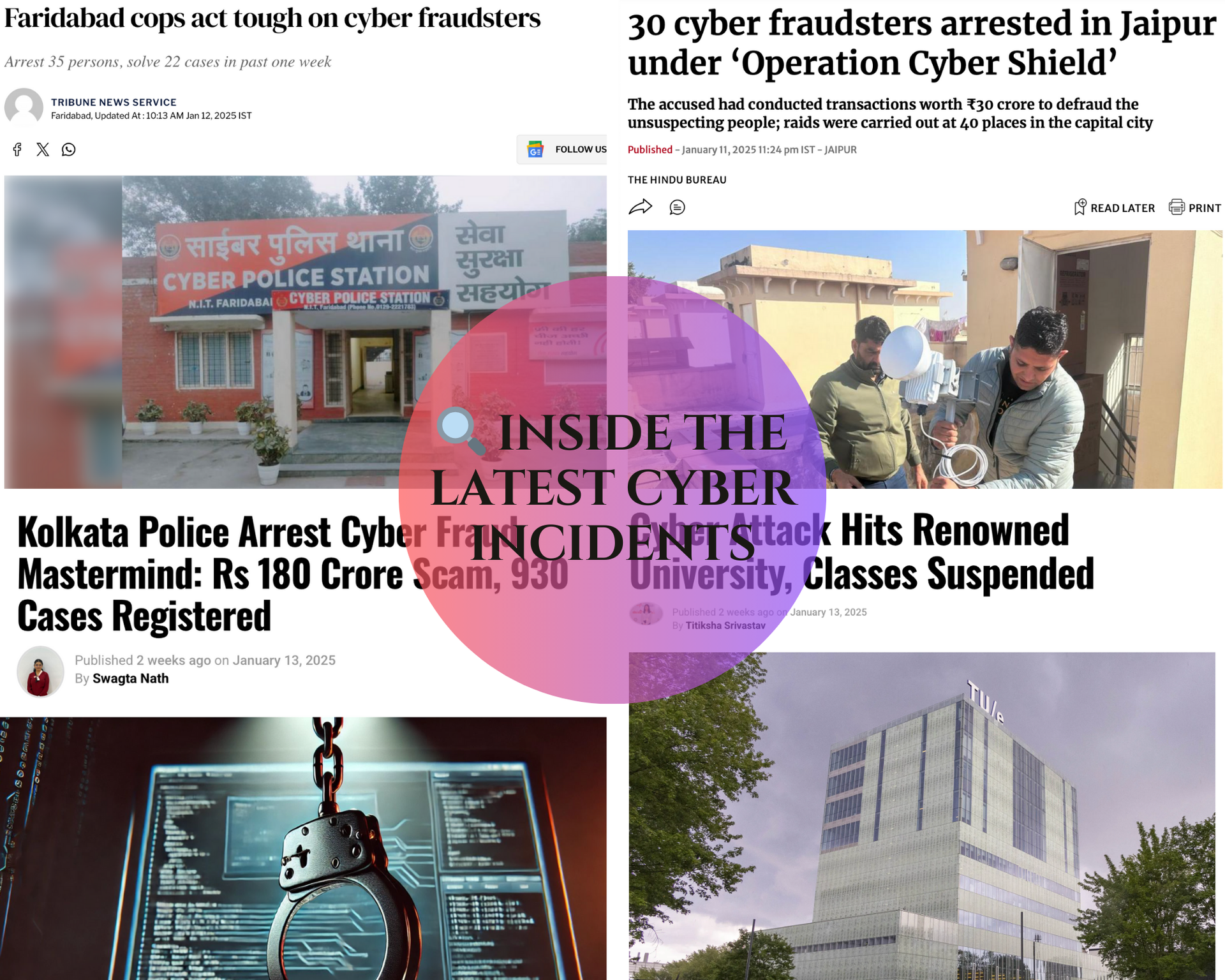Visionary Vigilance: Cybersecurity Digest – Ep. 10
Welcome to Visionary Vigilance, your trusted source for the latest developments in cybersecurity. This edition explores 13 in-depth stories, uncovering national and international cybercrime trends, fraud operations, and new threats that demand urgent attention. 🌐🔒
🔴 National News: Major Cybercrime Investigations and Crackdowns
1. Bihar’s Bizarre Cyber Fraud: ₹10 Lakh Scam for Fake Pregnancy Scheme
Bihar Police have arrested three cyber fraudsters who duped men by promising them a hefty payout of ₹10 lakh for impregnating childless women. The accused, identified as Prince Raj, Bhola Kumar, and Rahul Kumar, orchestrated their scam from Kauara village under the jurisdiction of Nadriganj Police Station. 🚨💰
Their modus operandi was meticulously designed to exploit gullible victims. Fraudsters posted fake advertisements across social media platforms, presenting themselves as intermediaries for elite fertility programs. Their scam was structured with a deceitful registration process, where victims were initially required to submit their Aadhaar details and pay an upfront “processing fee.” Once registered, they were manipulated into making further transactions, with fraudsters employing various psychological tactics to keep them engaged.
The police launched an investigation following complaints lodged by several victims who realized they had been duped. Acting swiftly, authorities traced the fraudulent activities back to the suspects, leading to their immediate arrest. This case underscores the growing need for cyber awareness, as criminals continue to exploit unconventional narratives to lure victims into financial traps.
2. Faridabad Cyber Police Arrest 35 Suspects in a Massive Crackdown
Faridabad Police have made significant progress in combating cyber fraud, arresting 35 suspects involved in 22 different cases of financial scams. The operation, conducted between January 4 and January 10, resulted in the recovery of ₹9.4 lakh, with ₹42,000 refunded directly to victims. 🚔🔍
The criminals, operating from various parts of the country, specialized in posing as financial advisors, customer care representatives, and stock market analysts to deceive unsuspecting individuals. Investigations revealed that they often lured victims with promises of high returns on investments or fraudulent government schemes. Once victims expressed interest, they were asked to install malicious apps or share sensitive details, allowing fraudsters to siphon funds from their accounts.
Authorities have urged the public to exercise caution when receiving unsolicited calls related to financial investments or banking issues. Individuals are advised to report suspicious activities immediately and refrain from sharing personal information without verification.
3. Kerala Police Take Down 28,724 Fraudulent Websites and Block 21,000 Social Media Accounts
In a massive cybercrime crackdown, Kerala Police have successfully removed 28,724 fraudulent websites and blocked 21,000 social media accounts linked to cyber fraud. The campaign targeted online financial scams, phishing networks, and fake job portals designed to steal users’ personal and financial information. 🖥️🚫
Additionally, investigators uncovered 36,000 fraudulent bank accounts linked to these scams. Many of these accounts were traced back to international cybercrime rings operating out of Southeast Asia, including Cambodia, Laos, and Myanmar. Authorities worked with social media platforms such as Meta and X (formerly Twitter) to take down accounts engaged in fraudulent activities.
Cybercrime investigators emphasize that while law enforcement continues to crack down on fraudulent activities, public awareness remains a key deterrent. Citizens are urged to remain vigilant and report suspicious online platforms.
4. ‘Operation Cyber Shield’: Rajasthan Police Arrest 30 Cybercriminals in Jaipur
As part of the ongoing ‘Operation Cyber Shield’, Rajasthan Police conducted raids across 40 locations, leading to the arrest of 30 cybercriminals who had collectively defrauded victims of ₹30 crore. These fraudsters used a variety of deceptive tactics, including pretending to be monks and astrologers offering spiritual guidance and rituals. 🔮📞
Authorities also discovered that some of the accused had undergone cyber fraud training in Sri Lanka. The criminals operated through eight organized fraud gangs, some of which focused on ATM fraud, phishing attacks, and online investment schemes. Law enforcement agencies blocked 135 bank accounts, 64 digital payment interfaces, and 20 ATMs linked to these scams.
Police have urged citizens to remain alert, especially when dealing with online transactions and unsolicited offers.
5. Airtel Employees Arrested for Providing 530 Virtual Numbers to Cybercriminals
In a significant development, two Airtel employees from Gurugram were arrested for their involvement in issuing 530 virtual numbers to Indonesian and Chinese cyber fraudsters. The suspects, Neeraj Walia and Hemant Sharma, exploited their positions within Airtel to facilitate fraud operations. 📞🚨
The investigation started after a woman reported losing ₹10,000 in a work-from-home scam. Cyber police traced the fraudulent number back to the Airtel network, leading to the arrest of Walia and Sharma. The scammers had tricked the victim by initially offering small payouts for online tasks before coercing her into transferring larger sums under the pretense of lucrative returns.
Authorities revealed that the virtual numbers were used in several high-profile scams, including investment fraud, e-commerce deception, and identity theft. Airtel confirmed that the employees had been suspended, and an internal probe is ongoing.
6. Maharashtra Cyber Department Saves Two Lives from Loan App Blackmail
The Maharashtra Cyber Department played a crucial role in preventing two suicides linked to harassment from fraudulent loan apps. Victims were subjected to extortion and public humiliation after taking small online loans. 🏦
A 22-year-old man from Pune borrowed ₹2,800 and repaid it, but was continuously harassed for more money. Cybercriminals morphed explicit images of his female relatives and threatened to distribute them online. The distressed victim contacted the 1930 cyber helpline, and authorities swiftly intervened.
In a similar case, a 35-year-old man who borrowed ₹5,060 for medical expenses was asked to pay double the amount. The fraudsters threatened to circulate morphed images, pushing him toward suicide. Timely intervention by cyber officials and police prevented both incidents.
The case highlights the dangers of unregulated lending apps and the importance of verifying financial service providers before engaging in transactions.
7. I4C Orders VPN App Takedown for Hoax Threat Emails
The Indian Cyber Crime Coordination Centre (I4C) directed Google to remove several VPN apps and Chrome extensions after cybercriminals used them to send hoax threats to schools, hospitals, and airports. 🌐🚔
I4C issued takedown notices for 11 VPN apps, 2 Chrome extensions, and 1 Windows installer, citing non-compliancewith law enforcement requests. The threats had created widespread panic, raising concerns over cybersecurity loopholes in anonymous browsing services.
8. 75-Year-Old Man Loses ₹28.3 Lakh in ‘Digital Arrest’ Scam
A senior citizen in Buldhana, Maharashtra, was tricked into believing he was under police investigation for money laundering, leading him to transfer ₹28.3 lakh to fraudsters. 📞💰
Scammers impersonated TRAI officials and Andheri Police officers, falsely claiming the victim’s Aadhaar-linked SIM cards were used for criminal activities. Under immense pressure, he redeemed his fixed deposits and transferred the amount before realizing the deception.
Authorities are investigating the case, warning the public to verify calls from so-called law enforcement officials and avoid sharing financial details under pressure.
9. Kolkata Police Arrest Cyber Fraud Mastermind in ₹180 Crore Scam
The Kolkata Police Cyber Crime Branch arrested Chirag Kapoor, also known as Chintak Raj, the mastermind behind a ₹180 crore cyber fraud syndicate. The gang was linked to 930 fraud cases nationwide. 👮♂️💻
Kapoor and his associates engaged in various frauds, including digital extortion, impersonation scams, and parcel frauds. Police recovered multiple bank passbooks, routers, SIM cards, and fake identity documents from Kapoor’s residence in Bengaluru.
This operation marks one of the largest cyber fraud busts in India, emphasizing the growing sophistication of online scams.
🌍 International News: Cyber Threats and Global Security Concerns
10. Cyber Attack Hits Dutch University, Classes Suspended
The Eindhoven University of Technology, a major partner of chip giant ASML, suspended all classes and operations after a severe cyber attack. 🏛️🔴
University officials shut down network access to prevent further damage. Investigators suspect the breach was an attempt to steal intellectual property, particularly related to semiconductor research.
11. World Economic Forum Report Highlights Cyber Inequity
A World Economic Forum (WEF) report revealed that cyber inequity is widening, with developing nations and smaller businesses struggling to keep pace with cybersecurity advancements. 🌍⚖️
The Global Cybersecurity Outlook 2025 noted that 54% of large companies cited supply chain vulnerabilities as their biggest concern. Meanwhile, one in three CEOs feared cyber espionage and intellectual property theft.
The report calls for greater international collaboration and equitable access to cybersecurity tools.
12. New Gmail Cyber Attack: Hackers Exploit Encryption Keys to Drain Crypto Wallets
Cybersecurity researchers have uncovered a new wave of Gmail-based cyberattacks, targeting Solana cryptocurrency wallets. Threat actors are using compromised Gmail accounts to exfiltrate private encryption keys, enabling them to drain victims’ digital assets. 📩🔐
According to Socket’s Threat Research Team, hackers have deployed malicious Node Package Manager (NPM) packages to intercept private keys from wallet interactions. These credentials are then relayed through Gmail’s SMTP servers to bypass traditional security firewalls.
This latest exploit underscores the growing sophistication of cybercriminals, who leverage trusted platforms like Gmail to evade detection. Security experts advise crypto investors to use hardware wallets and multi-factor authentication (MFA) to enhance security.
13. Cyber Attack Shuts Down Dutch University Linked to ASML Chipmaker
The Eindhoven University of Technology (TU/e) in the Netherlands was forced to suspend classes after falling victim to a major cyberattack. The university, which collaborates closely with semiconductor giant ASML, shut down its network as a precautionary measure to prevent further breaches. 🏛️🛑
Officials detected unusual activity on their servers and disconnected the institution’s systems to minimize risks. Investigators suspect that the attack may be linked to intellectual property theft, given ASML’s critical role in global chip manufacturing. The incident highlights the escalating cyber threats faced by research institutions and high-tech industries worldwide.
🌐 Closing Thoughts
This week’s Visionary Vigilance edition showcases the evolving tactics of cybercriminals and the proactive measures taken by law enforcement. From nationwide fraud crackdowns to global security threats, it’s clear that cybercrime is becoming increasingly sophisticated. Staying informed and adopting strong cybersecurity practices is the key to safeguarding personal and financial data.
Join us next week for more insights, and until then, stay cyber-secured with Visionary Bose! 🌍🔒
By : Shivam Dharpure
Founder & Director
+919691568071
Ambazari, Basti Verma Layout Road, Sudam Nagar, Nagpur
Maharashtra, 440033
[email protected]
www.thevisionarybose.com
All Rights Reserved | Visionary Bose Pvt Ltd




